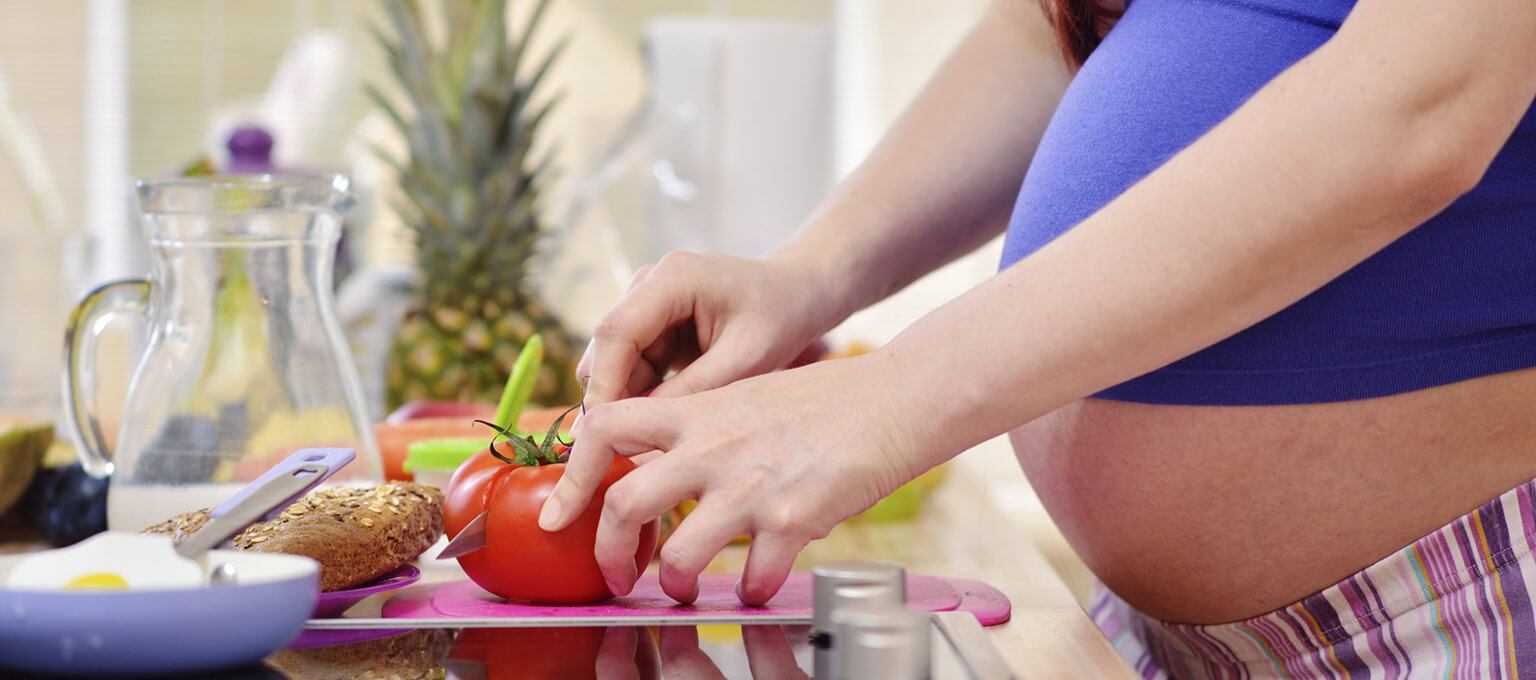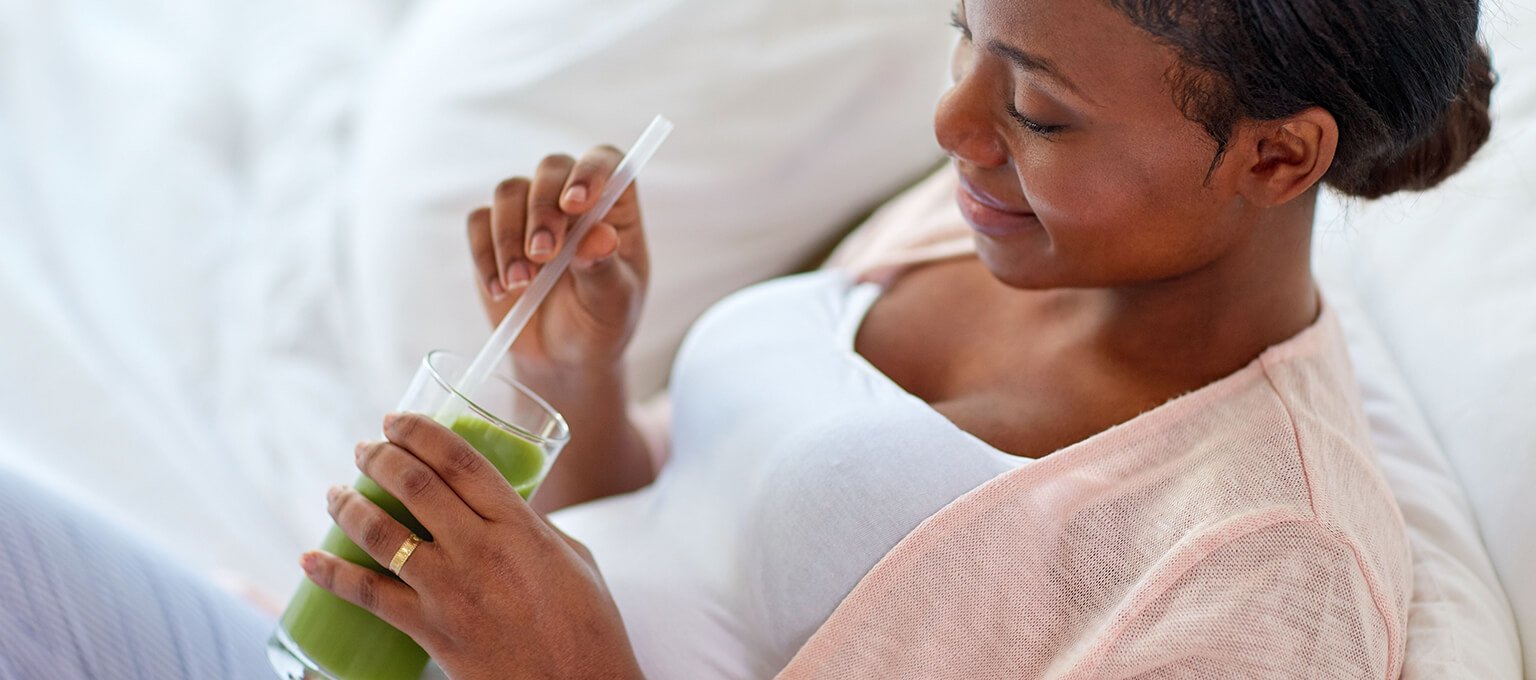When you’re pregnant, your eating habits become more important than ever. They affect your health, the way you feel, and, of course, your baby! Your baby's organs need the right amount of proteins, carbohydrates, and fats to develop properly, which is why getting the nutrients both of you need is crucial. Read on to find out what a healthy pregnancy diet can look like, and what foods best nourish you and your baby, along with related topics like nutrition for vegetarian moms-to-be, and what your pregnancy cravings might mean.
What Is a Healthy Pregnancy Diet?
Despite the name, a pregnancy diet is not about weight loss — the last thing you want to do is cut calories while pregnant. Instead, following a healthy diet during pregnancy is all about balance. You’ll want to get enough proteins, carbohydrates, and fats, as well as minerals and vitamins from the five main food groups: fruits, vegetables, grains, protein-rich foods like lean meats and eggs, and dairy products like yogurt and cheese.
What Nutrients You Need
During your pregnancy, you may need to increase your intake of certain nutrients. The most important is folic acid, which helps prevent birth defects of the brain and spine, but your iron and calcium intake matters, too. You can get a nutritional boost from a prenatal vitamin, but a well-rounded diet, including calcium- and iron-rich foods, may give you all you need to nourish yourself and your baby throughout pregnancy. Check with your healthcare provider for advice on whether you might need to take any extra supplements.
The Best Foods for You and Your Baby
Not sure what to include in your pregnancy diet? Here are some ideas:
- Packed with protein and containing vitamins D and B12, eggs are nutritional powerhouses, and they're quick and easy to prepare. Try them scrambled or on top of lightly fried rice.
- Dairy products. Low-fat milk, cheese, and yogurt are delicious sources of calcium. Try to drink milk a couple of times a day, and include a daily serving of yogurt or cheese (made with pasteurized milk).
- Portable and non-perishable, nuts and nut butters are perfect as on-the-go snacks and are excellent sources of protein and healthy fat. Almonds, peanuts, and walnuts are all good picks.
- Whether fresh, frozen, or canned, fruit is high in vitamins and fiber, and can help prevent constipation. Read the labels on canned fruit carefully; choose fruit packed in water rather than syrup.
- Iron-rich foods. You'll need a lot of iron during pregnancy to keep up your energy and ward off anemia. Stock up on lean meats, iron-fortified cereals, and spinach. Frozen spinach is especially affordable and easy to prepare; try mixing it into casseroles or a pasta sauce.

If you’re interested in what to eat to top up on a certain nutrient, see our table below.
|
Nutrient |
How much do I need? |
Food sources |
|
Protein |
About 60-71 g of protein per day, or more. A cup of milk or an ounce of red meat contains about 10 g of protein. |
|
|
Calcium |
The recommended daily amount of calcium during pregnancy is 1,000 mg per day (1,300 mg a day if you are younger than 19). A cup of milk contains about 300 mg of calcium. |
|
|
Iron |
You’ll need about 27 mg a day while you're pregnant. As an example, there is about 3 mg of iron in 1/2 cup of boiled spinach and about 3 mg in 3 oz. of roasted lean beef tenderloin. |
|
|
Folic acid |
You’ll need about 0.6 mg of folic acid per day when you’re pregnant. It may be tricky to get all the folic acid you need from food sources alone, so your healthcare provider may recommend a supplement. |
|
For more information about the amounts of vegetables, grains, and fruits you might need per day in each trimester of pregnancy, download our pregnancy nutrition guide.
Foods to Avoid in a Pregnancy Diet Plan
Although fish is good for you, some fish and seafood, like older or larger fish, can be high in mercury. Try to consume fish in moderation, and avoid fish like shark, swordfish, king mackerel, and tilefish. You should also stay away from any kind of raw, undercooked, or contaminated seafood, meat, poultry, or eggs. You can read more on food to avoid during pregnancy. Plus, it’s always a good idea to ask your healthcare provider about any specific foods you personally may need to steer clear of. There’s a lot to think about, but for even more useful dos and don’ts, check out our guide to pregnancy.

Drinks During Pregnancy
Staying hydrated is important, which is why you should drink about 10 cups of fluid daily. Water is the best option: It gets right to work hydrating every part of your body. Getting enough water can keep you from becoming constipated, help prevent your skin from getting too dry, and flush toxins and waste products from your body efficiently.
But what about other fluids, like soda, coffee, and tea?
- Coffee and tea. There is no need to cut out your morning cup of Joe while you’re pregnant, but it’s best to limit caffeine to less than 200 milligrams a day. That’s around two cups of brewed coffee or four cups of brewed tea.
- Herbal tea. Although herbal tea is often touted as a caffeine-free alternative to black tea and coffee, there is little data on the effects that some herbs may have on developing babies. So, unless your healthcare provider gives you the OK, it’s best to avoid herbal tea altogether — even when it comes to teas marketed to pregnant women.
- You’ve probably heard that alcohol is a no-no for pregnant women. No level of alcohol has been proven to be harmless during pregnancy, so play it safe, and avoid alcohol entirely.
- You don’t need to completely eliminate soda from your diet during pregnancy, but it does have some qualities that aren't so good for you or your baby. Regular soda is packed with sugar, and diet soda can be filled with aspartame or other artificial sweeteners, neither of which are good for you in large amounts. If you absolutely love soda, having it occasionally isn't going to hurt you; however, you're far better off drinking water and fruit juices during pregnancy.
Tips for Vegetarians
Just because you’re vegetarian doesn’t mean you can’t get the nutrients you and your baby need. You may need to adjust your eating habits for a healthy vegetarian pregnancy diet, but there are plenty of non-meat food sources that can satisfy your nutritional needs.
- Three servings per day of ½ a cup of cooked, dried beans, peas, or tofu; ¼ cup of nuts and seeds; 2 tablespoons of peanut butter; one egg; or two egg whites should meet your protein needs.
- You’ll want to eat at least four servings of calcium-rich foods per day. These include dairy products; fortified, non-dairy milk like coconut or almond milk; leafy, green vegetables; tofu; dried beans; and peas.
- Even on a vegetarian diet you can get the 27 milligrams needed from three servings of iron-rich foods like eggs, enriched grain products, leafy, green vegetables, sweet potatoes, raisins, prunes, peanuts, dried beans, and peas. If you’re concerned about getting enough iron, talk to your healthcare provider about whether you need any supplements.
- Vitamin B12. This is one of the few vitamins found in animal products only (like eggs and dairy), so if you’re vegan, you may need to eat vitamin B12-fortified foods or get it from an alternative source like nutritional yeast or a supplement.
How Much Weight to Gain During Pregnancy
Eating for two doesn’t actually mean doubling your portions. Most pregnant women only need about 340 additional calories per day during the second trimester. This is the equivalent of a glass of skim milk and half a sandwich. If you're carrying twins, you'll probably need 600 extra calories a day. Learn more about this topic by checking out our pregnancy weight tracker guide.
Pregnancy Cravings
No one really knows why some women crave certain foods during pregnancy, but cravings are not generally thought to be caused by food deficiencies. There is no reason to avoid foods you crave as long as you eat in moderation to avoid excessive weight gain. These food cravings tend to be particularly strong during the first trimester, but will pass with time.
Some pregnant women crave non-food items, such as laundry starch or clay. This is a condition called pica. If you crave non-food items, be sure to tell your healthcare provider.
There is a lot to think of when it comes to maintaining a healthy pregnancy diet, but don’t stress too much if you don’t quite hit your iron or calcium quota one day, or if you’re craving ice cream and decide to treat yourself. Just try to have balanced meals, and speak to your healthcare provider about how to get all those nutrients you and your baby need.




